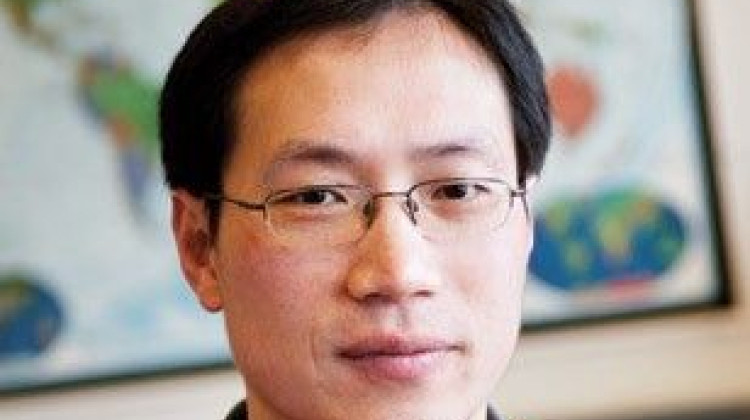
Based on an interview with Tanford, Indiana Public Media reconstructed a timeline of events, from the first allegations of misconduct against Wang, to his enforced leave of absence and his eventual firing.
Courtesy Indiana UniversityXiaoFeng Wang, the tenured cybersecurity professor fired by Indiana University the same day as mysterious FBI raids on his homes, stood accused of academic misconduct for not properly identifying people involved in his research.
Details of IU’s investigation into Wang are beginning to emerge. Information about the FBI searches are not.
Professor Alex Tanford, president of the American Association of University Professors Bloomington chapter, got access to communications between Wang and IU administrators.
Based on an interview with Tanford, Indiana Public Media reconstructed a timeline of events, from the first allegations of misconduct against Wang, to his enforced leave of absence and his eventual firing.
Research misconduct allegations against Wang
Wang is a prominent figure in the field of cybersecurity, leading several national research organizations during his two decades at IU. According to his now-removed faculty profile, he served as primary investigator on projects totaling nearly $23 million.
But this spring, with no explanation given, he vanished from the university. His colleagues were not even told he had been fired.
According to Tanford, it began with a complaint from an unknown source.
In mid-February, the Office of Research Compliance at IU notified Wang that someone had submitted misconduct allegations against him. He had been accused of mislabeling the principal investigator for a grant and failing to disclose co-authors.
“While these are technical violations of research protocols, they’re not serious and they happen all the time,” Tanford said. The specifics of those allegations remain undisclosed.
By March, the university opened an investigation. Wang was placed on paid leave and suspended from campus, what the research misconduct policy refers to as an “interim administrative action.” He was locked out of his office and laptop while the university began its search.
Tanford said that’s when he learned about Wang’s case. A professor emeritus at the Maurer School of Law, Tanford also served as chair of the University Faculty Council Policy Review Committee and on IU’s Faculty Board of Review, a faculty governance group that investigates alleged infringements on academic freedom.
Based on his experience, it raised concern but didn’t immediately trigger red flags.
The steps IU took were consistent with investigations into possible severe research misconduct, not a prejudgment of guilt.
But around that time, Tanford said Wang’s wife Nianli Ma had been fired from the university.
At some point prior to the FBI searching his homes, references to Ma, a staff member with IU libraries, were scrubbed from IU websites. So far, the university has not commented on Ma’s employment status.
Indiana Public Media first noticed references to Wang himself were removed on March 18.
Wang was fired, but the investigation is likely still open
On the morning of March 28, Tanford’s daughter texted him that the FBI was searching the Bloomington home of a professor who lives next door to one of her high school classmates.
“That’s how I found out about it,” he said.
The FBI and the Department of Homeland Security simultaneously searched Wang’s homes in Carmel and Bloomington. Although neighbors and reporters saw officers carrying boxes from the houses, no arrests were reported. The FBI declined to comment beyond acknowledging the search.
That afternoon, Tanford received the letter sent to Wang and signed by IU Provost Rahul Shrivastav notifying him that he had been fired. That email was sent at 2:14 p.m. No reason was given for his dismissal.
Given his experience in faculty governance, Tanford believes it’s unlikely IU has actually concluded its investigation.
“I would imagine given the heat that the administration is taking that it would be all over the press release if he, in fact, was discovered to have been engaged in some serious misconduct of some kind,” Tanford said. “Silence speaks volumes.”
Tanford said he doesn’t know why the FBI searched Wang’s homes.
Indiana Public Media contacted two attorneys representing Wang, Jackie Bennett Jr. and Matthew Gutwein, and asked them to confirm this sequence of events. Both declined to comment.
IU was also asked to correct any errors in the timeline. Spokesperson Mark Bode said, “at the direction of the FBI, Indiana University will not make any public comments regarding this investigation.”
Tanford said as a faculty representative, his main worries lie with the university’s sudden unexplained dismissal of a tenured professor.
“Under normal times, one would expect somebody in the administration of the university, if they're being gone after by Homeland Security, to speak up for him, to at least say he's been here 20 years, he's a distinguished and world respected scholar, he's been in all respect an exemplary faculty member,” Tanford said. “And there's silence. And that's just not acceptable.”
 DONATE
DONATE






 Support WFYI. We can't do it without you.
Support WFYI. We can't do it without you.